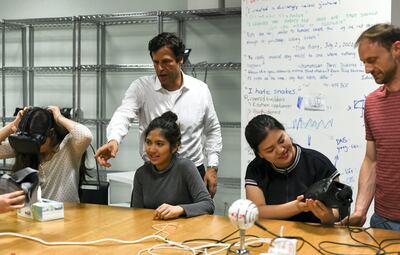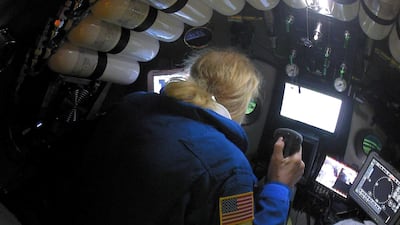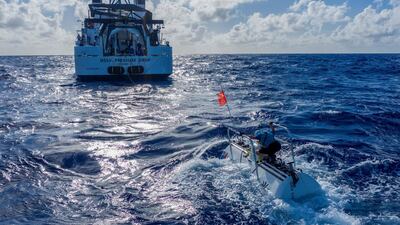There is a specific word that the Bafta Award-winning film producer and virtual reality pioneer Anthony Geffen likes to use to describe his work. "Edutainment" – a combination of "education" and "entertainment" – is Geffen's preferred method of storytelling. The key to successful "edutainment" is to inform people without actually telling them that's what's happening. "It's a very important medium," says Geffen.
To ensure his audience is thoroughly "edutained", Geffen, who founded Atlantic Productions in London in 1993, continually pushes the limits of technology, utilising the latest VR and immersive storytelling techniques. His projects have, among many other things, allowed viewers to explore the depths of the ocean, reach the summit of Everest and meet an Amazonian tribe.
He is currently working on a series that will take us on an interactive journey down to the wreck of the Titanic. And later this year, another Atlantic Productions project, History of the Emirates, a five-part series about the UAE made for Image Nation Abu Dhabi, will be released. It spans 125,000 years and, using CGI, recreates ancient sites and the original landscape of the region. "It's a really major series," says Geffen. "We've pulled out all the bells and whistles."
In 2017, Geffen and his team created Space Descent, a 12-minute VR, 5K experience at the Science Museum in London, in which people were able to relive the 400-kilometre journey from the International Space Station back to Earth inside a digital version of the capsule used by British astronaut Tim Peake. "It was one of the perfect VR experiences," says Geffen. "A strong story combined with really strong visuals – there was a big appetite for it."
The impact that edutainment can have is remarkable. Space Descent was taken to one of the poorest parts of Britain and, six months later, a study was carried out on the children who experienced it. "Their aspirations had changed," says Geffen. "They no longer wanted to be waiters or railway drivers. They suddenly thought, 'Wow, what about engineering?' Their eyes were opened."
Geffen is now taking an even more direct approach to edutainment by putting together and leading the world's first immersive storytelling course at NYU Abu Dhabi. The course, which is called Immersive Storytelling and the Art of Making the Virtual a Reality, will teach students everything from the theory and genesis of storytelling, going back to cave paintings, right through to teaching them how to shoot their own immersive films. "We're trying to provide the students with a toolkit to do something different," says Geffen. "NYU Abu Dhabi happens to be incredibly modern and forward-looking."

Geffen shows me round one of the classrooms on campus. The students are fiddling with VR headsets and written on a whiteboard are the names of fictional production companies the students have come up with: Tower Productions; VR Chemists; Neon Azure. "One of those will be a Google," says Geffen. "I'll be thinking, 'I've seen that name somewhere before.'"
He is only half-joking. There will be epic technological shifts over the next decade and Geffen says he hopes these NYU Abu Dhabi students will be at the forefront of such innovations. “In three or four years, there probably won’t be handsets any more,” he says. “If the technology is changing, where do we have to take it? To the students, because in a few years, they will be the archaeologists, architects, scientists and doctors.
“I think we’re on the cusp of big change. I want to sow seeds across the world and say, ‘Come on guys, you do something because these are stories I want to hear.’ That is what this is about.”
Geffen's belief in VR and immersive storytelling is absolute – and he has had the success to validate these convictions. Geffen has worked with Sir David Attenborough on 11 projects, including the Emmy Award-winning David Attenborough's First Life, which used computer animation to bring fossils to life on screen, and David Attenborough's Great Barrier Reef, an interactive series where viewers experienced what it would be like to explore the reef in a submersible with Attenborough as co-pilot. "If you're actually sitting there with Attenborough behind you, it's something special," he says.
Last month, Atlantic Productions also filmed the record-breaking descent by US billionaire and explorer Victor Vescovo to the bottom of the deepest point in Earth's oceans, the Mariana Trench in the Pacific Ocean. Thanks to the work of Geffen and his team, the journey of about 11km is one that viewers will soon be able to interactively experience for themselves. "The danger of going deep is much greater than going into space," says Geffen.
And what will we see at the bottom of the ocean? Much of the press coverage of this dive has focused on the discovery of a plastic bag and the environmental implications of that. "To go to the deepest place on Earth and find a human object is pretty amazing," says Geffen. "If that is where plastic is being collected then there is clearly nowhere else for it go."

Intriguingly, however, Geffen explains that many of their findings from the bottom of the Mariana Trench have yet to be revealed. “We haven’t actually announced what we found down there, new species and all sorts of other things,” he says. “Nasa will study what we saw because this is the life we will find on other planets.”
It was Geffen's ambition and willingness to take risks with cutting-edge technology that first attracted the attention of physicist and author of A Brief History of Time, Stephen Hawking. The pair met in 2017, a year before Hawking died, and began working on a VR project. Due to be released later this year alongside a feature-length film about Hawking's life, this VR journey will allow viewers to take a tour of the universe, black holes, faraway galaxies and all.

"He's utterly inspirational," says Geffen. "Most people in that world can see numbers. But he could see shapes and he could see the colours of the planets. It was almost like, 'Well, what are you seeing?'
"I suddenly realised when I was talking to him that we could actually translate his mind into a universe that you would go in. I think it will bring tears to people's eyes actually, because he's a hologram that you can see. This is his journey; he doesn't believe in the afterlife, this is his way of transporting his knowledge."
As our conversation concludes, we return again to Attenborough. It is, Geffen says, the veteran British broadcaster's curiosity that has allowed him to continue working well into his 90s. Geffen has plenty of that curiosity, too. "I want to know how things work and how they feel," he says.
And then he wants to share that information with the rest of us in the most engaging way possible. “Storytelling matters because it’s the way you communicate with lots of other people,” he says. “It allows other people to go on journeys and to challenge their beliefs. This new technology is nothing without storytelling.”
If Geffen’s students at NYU Abu Dhabi take away just a little bit of his enthusiasm, the future of immersive storytelling could be more exciting than even Geffen would dare to imagine.


